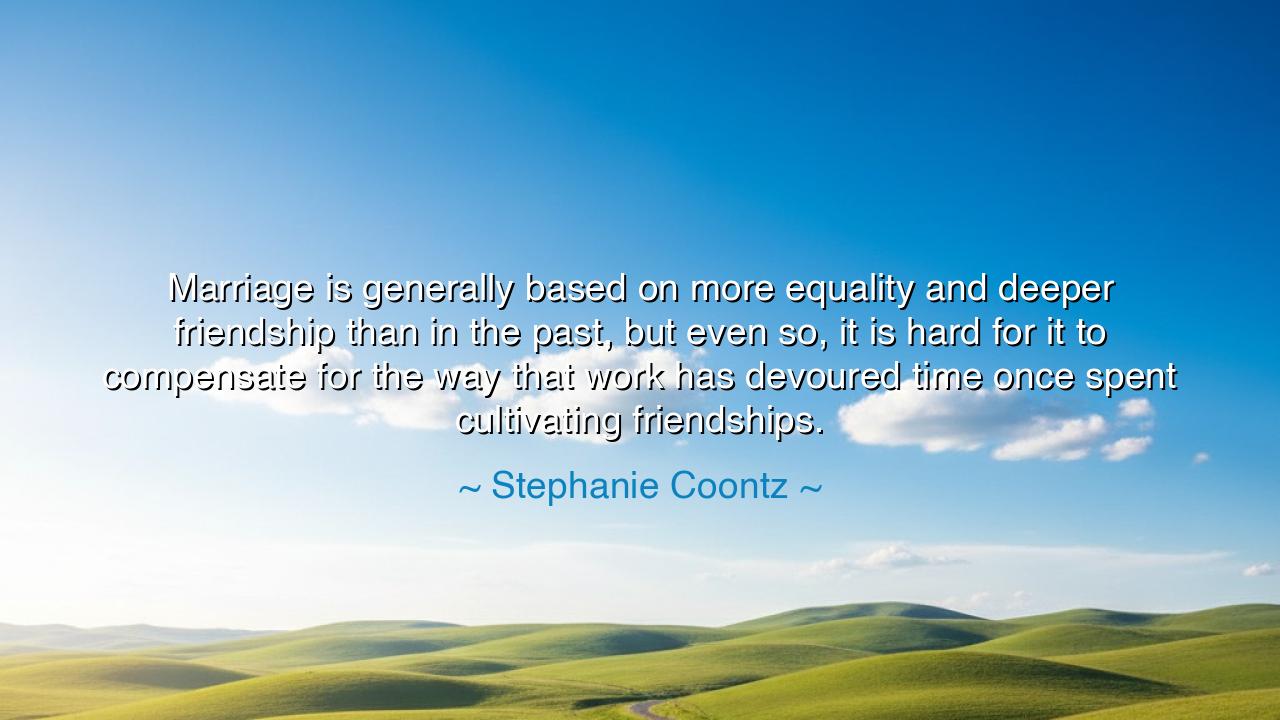
Marriage is generally based on more equality and deeper
Marriage is generally based on more equality and deeper friendship than in the past, but even so, it is hard for it to compensate for the way that work has devoured time once spent cultivating friendships.






The historian and social critic Stephanie Coontz, a scholar of love, marriage, and family, once wrote: “Marriage is generally based on more equality and deeper friendship than in the past, but even so, it is hard for it to compensate for the way that work has devoured time once spent cultivating friendships.” In these words lies a profound lament for the modern condition—a truth spoken not with bitterness, but with clarity and care. Coontz reminds us that even as marriage has evolved toward equality and emotional intimacy, another force—quieter, more insidious—has risen to erode the human heart’s wider web of connection: the relentless hunger of work, the ceaseless demand of labor that steals from us the time once devoted to friendship, leisure, and shared humanity.
The meaning of her reflection is layered and deeply human. She celebrates progress—the way modern love has become a partnership not of power, but of companionship. No longer bound by hierarchy, many marriages today are built upon mutual respect and friendship, upon shared laughter rather than duty alone. Yet she mourns what this progress has not healed: the loss of community that once surrounded and sustained individuals. For even the most intimate marriage cannot replace the many friendships that once nourished the spirit. To expect one relationship to bear all the emotional weight that once belonged to an entire village of friends is to strain it, and in that strain, even love itself may falter.
The origin of this wisdom can be traced to the long arc of human history. In ages past, life was not easy, but it was communal. Villages, neighborhoods, and kinship circles formed the fabric of existence. A man or woman did not seek all comfort from a single bond; their happiness was woven from many threads—family, faith, friendship, and fellowship. In the modern age, as the Industrial Revolution and the rise of capitalism reshaped society, work began to consume not only our labor but our time, our attention, and our capacity for connection. The workplace replaced the hearth as the center of life, and the hours once filled with conversation, laughter, and shared meals were surrendered to the march of productivity. Coontz’s lament, then, is the cry of a civilization that has forgotten the sacred art of leisure—the stillness in which friendship grows.
History bears witness to this truth. Consider the story of C.S. Lewis and the Inklings, a circle of writers and thinkers who met weekly at the Eagle and Child pub in Oxford. Their meetings, filled with laughter, debate, and imagination, nurtured some of the greatest literary works of the twentieth century, including The Chronicles of Narnia and The Lord of the Rings. Their friendship was not a distraction from work—it was the wellspring of it. Yet, in today’s world, such fellowship has become rare. The modern worker, chained to screens and schedules, rarely finds the time to meet companions face to face. The creative and emotional nourishment that once came from community now withers in the shadow of efficiency. Coontz’s insight reminds us that even as we pursue equality and love at home, we must also reclaim the lost art of friendship beyond it.
There is a quiet tragedy in her observation. For though marriage has grown deeper and kinder, it cannot bear the burden of isolation that modern life imposes. No single relationship—no matter how loving—can fulfill every need of the human soul. Friendship offers something different: the freedom of laughter without duty, of understanding without expectation. It provides a mirror to the self that is not confined by romance or obligation. When work devours this space, we lose not only companionship but also parts of ourselves—our playfulness, our curiosity, our capacity to wonder. To neglect friendship is to neglect joy itself.
And yet, Coontz’s tone is not one of despair, but of awakening. Her words call us to reclaim what we have lost—to resist the slow erosion of our shared humanity. The remedy she implies is simple, though not easy: we must make time. Just as the ancients gathered in courtyards and gardens to converse, we must carve sacred hours from the grasp of labor and dedicate them to those who lighten our hearts. To write a letter, to share a meal, to walk beside a friend and speak without agenda—these are not luxuries, but acts of rebellion against a world that would measure all worth by productivity.
The lesson of her wisdom is thus both practical and profound. Do not let the demands of your work consume the hours meant for connection. Nurture your marriage, yes, but do not neglect your friendships, for they, too, sustain your soul. Seek balance: let your labor serve your life, not the other way around. Remember that no achievement, no wealth, no advancement can replace the laughter of a friend who knows your heart. As Coontz reminds us, equality in love is a triumph, but friendship in life is salvation—the broader circle of warmth in which the spirit finds rest.
So let Stephanie Coontz’s words echo like an ancient warning to a modern people: that progress without community is a hollow victory, and love without friendship is a flame that burns alone. Reclaim your time, restore your connections, and remember that even as work builds the world, it is friendship that gives it meaning. For in the end, it is not what we produce, but whom we walk beside, that defines the worth of our days.






AAdministratorAdministrator
Welcome, honored guests. Please leave a comment, we will respond soon